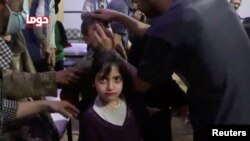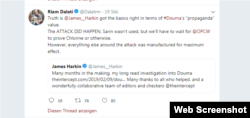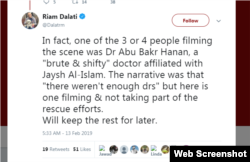On February 14, the official Twitter account of the Russian Embassy in the United Kingdom claimed that a BBC producer admitted that video recorded from a hospital after a suspected sarin attack in the Syrian town of Douma last April was “staged.” The embassy’s tweet included a screenshot showing several tweets by the producer, Riam Dalati, in which he supposedly made the claim. Shortly thereafter, Dalati’s Twitter account was set to protected status, making it impossible for anyone without permission to view his timeline.
Luckily, Dalati’s tweets are still accessible thanks to the web archive, and when one reads his whole thread on the Douma attack, it becomes clear that the Russian Embassy left out a tweet in which Dalati emphasized that a chemical attack did happen in Douma, and that it may have involved chlorine, not sarin.
Following Dalati's tweets and the Russian UK Embassy's responding tweet,.Russian state media jumped on the story, though it should be pointed out that RT actually quoted Dalati's follow up tweet stating the attack did happen.
In the immediate aftermath of the Douma attack, some eyewitnesses and foreign observers suspected that sarin or another nerve agent could have been responsible. Some signs of sarin poisoning are similar to those of chlorine poisoning, and thus could be mistaken by a layperson. As more evidence emerged, chlorine was revealed to be the likely culprit based on several factors. Dalati further stated that the OPCW (Organization for the Prohibition of Chemical Weapons) would have to determine whether or not chlorine was the chemical agent, but the OPCW did just that last year.
An interim OPCW report published on July 6, 2018 stated that no traces of nerve agent (such as sarin) were found, but that “chlorinated organic chemicals” were detected at two sites that were inspected. The report stated that inspectors had a “full chain of custody” for the samples bearing traces of the aforementioned chemical compounds.
It should be noted that nowhere in his thread on this subject does Dalati present any concrete evidence for his claims. The closest he gets is identifying Dr. Abu Bakr Hanan, who he calls “brute & shifty” and allegedly associated with Jaysh-al-Islam, the militant group that held Douma at the time. He did not elaborate further on the background or identity of this doctor, only alleging that Hanan claimed there weren’t enough doctors to treat the chemical attack victims though he was filming the video in the hospital. He also alleged that Jaysh-al-Islam “ruled Douma with an iron fist.” Neither of these make a particularly strong case for the hospital video having been staged.
Prior to the attack, which took place on the night of April 7, Jaysh al-Islam refused to negotiate with the Syrian government and was determined to remain in Douma. However, less than a day after the chemical attack, the group returned to the negotiating table and managed to secure safe passage out of the town for its fighters and their family members. The Telegraph newspaper quoted a senior member of the group who explicitly stated that the chemical attack was the reason for the retreat. Dalati provides no evidence the militant group staged the hospital scene following an attack that admittedly drove Jaysh al-Islam from Douma. The Telegraph news article portrayed the retreat as a defeat for anti-Assad rebels.
Lastly, the hospital video was not the only evidence put forward of the chemical attack. On the contrary, far more complete evidence of the attack was available shortly after it happened. Video taken in the apartment building where the attack took place showed piles of bodies with signs of poisoning. (The tweet below contains video that some readers may find disturbing. Discretion is advised):
The New York Times also conducted an investigation into the incident, using videos of the victims and photos, including an image of the chlorine canister that landed on the roof of the building, punching a hole in the ceiling. The newspaper said it enlisted "academics, scientists and chemical weapons experts" as well as a forensics company, concluding that a chlorine canister was dropped from a helicopter and landed on the apartment building where the victims were found. Notably, the New York Times’ investigation did not present as evidence the video from the hospital, which Dalati alleged was staged.
So, what do we know?
- Independent journalists and forensic experts conclude a chlorine canister was dropped on the apartment building.
- The OPCW in a preliminary report says chlorine was detected at the scene.
- Dalati alleges the scene at the hospital, well away from the apartment building, was staged.
- He further tweets "the ATTACK DID HAPPEN."
- The Russian Embassy in the UK omits that conclusion from its own Twitter account -- which leads to our "misleading" verdict.
It's important to consider the possibility Dalati's allegation that the hospital video was staged could be true, but so far he has provided no verifiable evidence for the claim, which he said he could "conclusively" prove. In the future, if he does provide such evidence, we will weigh that on its own merit.
Polygraph.info also sought information and comment from the BBC regarding Dalati's status with the BBC - whether he was posted in the Douma area at the time and if the findings that he tweeted were considered BBC reporting and discussed with editors. We have received no response, If we do so, we will update this fact check.







